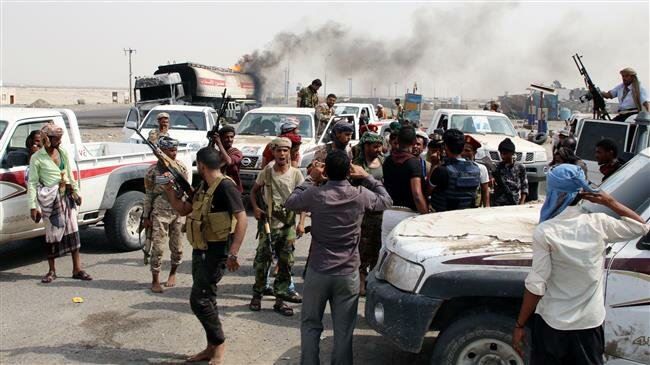UAE-backed militiamen committed some 7,000 rights violations in Yemen in August: Rights group
YemenExtra
Y.A
An independent human rights group says it documented 6,978 cases of grave human rights violations committed by militiamen backed by the United Arab Emirates (UAE) against civilians in the southern Yemeni provinces of Aden, Abyan and Shabwah during the month of August.
The Yemeni American Observatory for the Protection of Human Rights said in a statement on Sunday that its field teams had recorded the murder of 48 civilians, including six women and eight children, between August 2 and 30.
It added that 16 people lost their lives due to gunshot wounds, 10 were killed in missile strikes, a dozen more were liquidated in secret prisons run the UAE, six more were fatally shot, and another four were killed as a result of indiscriminate shelling of residential buildings.
The Observatory also documented 193 cases of torture and ill-treatment of detainees in Aden prisons operated by UAE forces, stating that various forms of torture, including electricity shocks, drilling, suspension, sleep deprivation, the use of salt on wounds, complete medical negligence, burning with cigarettes, humiliation and whipping are being carried out.
It further noted that sexual torture is practiced mainly inside a prison at al-Bareeqa base, the house of Aden’s Security Chief Shalal Shaya – a staunch advocate for the partition of Yemen who has a close working relationship with the UAE as well as the notorious Bir Ahmed prison.
Rape is done as a means of forcing detainees in some cases to collaborate with Emirati forces and to spy on certain people, according to witnesses.
The Observatory went on to say that 14 pregnant women have suffered miscarriage as a result of fear and panic in Aden, while four others went through a similar hardship in Abyan and another three in Shabwah.
It further noted that sexual torture is practiced mainly inside a prison at al-Bareeqa base, the house of Aden’s Security Chief Shalal Shaya – a staunch advocate for the partition of Yemen who has a close working relationship with the UAE as well as the notorious Bir Ahmed prison.
Rape is done as a means of forcing detainees in some cases to collaborate with Emirati forces and to spy on certain people, according to witnesses.
The Observatory went on to say that 14 pregnant women have suffered miscarriage as a result of fear and panic in Aden, while four others went through a similar hardship in Abyan and another three in Shabwah.
It also recorded 583 cases of abduction and forced detention of civilians, stressing that militiamen from the so-called Southern Transitional Council carried out a massive campaign of raids and systematic looting of houses of citizens.
Moreover, the Observatory also registered the displacement of 3,163 people in addition to 374 cases of physical assault against displaced citizens.
The director of the Observatory, Afrah al-Akhali, called on the UN Security Council and the Human Rights Council to issue an international draft resolution that classifies the Southern Transitional Council as a terrorist movement, which threatens local and international peace and security and to confront systematic violations against civilians
Akhali also held the UAE fully responsible and stated that the Observatory reserves the right to prosecute the Abu Dhabi regime before the International Court of Justice as well as the International Criminal Court over its crimes in Yemen.
Both the UAE-sponsored separatists and the Saudi-backed militiamen loyal to the former Yemeni president, Abd Rabbuh Mansur Hadi, serve the Riyadh-led coalition and have been engaged, since 2015, in a bloody war on Yemen aimed at reinstating Hadi and crushing the popular Houthi Ansarullah movement.
Ties between the two sides have soured over a number of issues, including what the Yemenis view as Abu Dhabi’s intention to occupy Yemen’s strategic Socotra Island and gain dominance over the major waterways in the region.
Last month, the UAE announced a surprise plan to withdraw part of its troops from Yemen, largely because Abu Dhabi believes the war appears to have become “unwinnable,” according to US reports.
The Western-backed war on Yemen, coupled with a naval blockade, has killed tens of thousands of Yemenis, destroyed the country’s infrastructure, and led to a massive humanitarian crisis.
The US-based Armed Conflict Location and Event Data Project (ACLED), a nonprofit conflict-research organization, estimates that the war has claimed more than 91,000 lives over the past four and a half years
Source:Websites

